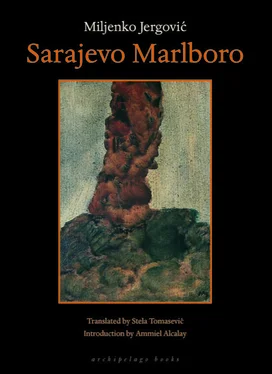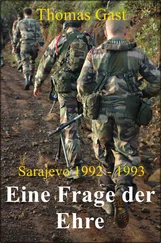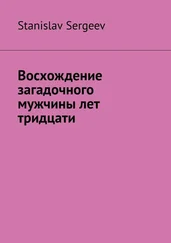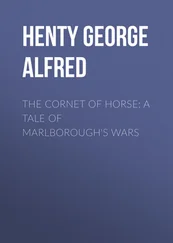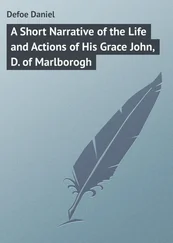The water lasted for days so I didn’t go out. I sat on the table by the window and stared at the concrete slabs below. If you looked closely, you could already see blades of grass growing in the cracks. I leaned out of the window as far as I liked, without my heart beating faster. I was free and happy: I didn’t have to write messages, I didn’t have to suffer or to explain myself to anybody. The world vanishes if you don’t talk.
In the pantry I found a little bag of compost and some light styrofoam boxes, just big enough to bury a rat in. I mixed the compost with the infertile soil from the children’s playground. There was something hypnotic about touching the damp black-brown dust with my fingers. I could have kneaded and stroked the soil for hours. I scattered the seeds and marked the boxes. I placed them under the window and watered them. I think I read in a book somewhere that Wittgenstein didn’t in fact want to be a gardener but an aeronautical engineer. Does that mean a pilot or something else? I returned to the window and looked down again with a kind of resignation. All I’d have to do is persuade myself I’m a canary. Nobody would believe that I’d jumped out of the window immediately after sowing the seeds. I can already see people whispering that somebody had pushed me. Otherwise the carrots, parsnips and lettuce would never have been planted.
I don’t go to the cemetery, as I explained to Tadija, because there are too many fresh graves there. It is vulgar to visit them all one by one. He pulled out a cigarette, which he snapped in two, giving me the half without the filter. His cold sore has been there for weeks and so he can’t really manage the tiny cigarette ends any more. I put my half away in my pocket, for later. He looked at me and shrugged.
Friar Andro sent word to the girls that Ivanka had died. They asked about me. I don’t know what he told them. Whatever happens they should know that I’m ok. I flick through books, read and wait for the carrots, parsnips and the lettuce to grow. Humans live out of curiosity. That’s the best and most honest way. Anything else is just a false way of courting other people’s tears. Camus demanded and gave melodramatic explanations. For those whose death isn’t accidental, the situation is as follows: women and homosexuals slit their wrists, soldiers and boors shoot themselves in the head, actors and romantics swallow pills, the clumsy and the neurotic shoot themselves in the heart, the ignorant and the perverse hang themselves, the ambitious and the weak jump off bridges, sad cases and intellectuals jump from roofs or top floors.
The parsnip was the first to sprout, followed by the lettuce and finally the carrots. The tiny leaves are as soft as a newborn baby’s hair. I watered them before I went to visit Tadija in the hospital. The doctors don’t know what is wrong with him. He has shrunk to half his size and the cold sore still hasn’t disappeared. I offered him a cigarette as we sat on the bench in front of the hospital. He took a penknife out of his pocket, divided the cigarette in two and gave me the end with the filter. He’s got used to having the other end, he says, it doesn’t bother him any more. We sat and smoked. I told him about the parsnips, lettuce and carrots. He replied that he was now quite sure that Wittgenstein had wanted to be an aeronautical engineer.
The lettuce was the first to be ready for picking. I pulled off two heads, washed and cleaned them, wrapped them in newspaper and took them to the market. I gave them to the first woman who came along for two cigarettes. Everyone looked at me strangely. A Gypsy said that he would have given me two boxes of cigarettes for the lettuce. That’s fine, I replied, but the woman didn’t have two boxes of cigarettes. The Gypsy swore and went off.
I pulled out three small, as yet unripe carrots and washed them. I put two cigarettes in my other pocket and went to the hospital. Almost timidly, the doctor asked me if Tadija had been a relation. I said no — he was my friend.
“Yes, of course — is, ” replied the doctor, extending his hand, “but I have to inform you that you will no longer be able to talk to him.”
“No problem,” I said, pulling out the cigarettes and carrots. “This is for you because you looked after Tadija.” He shivered and withdrew his hand. “Don’t be silly,” I smiled. “Take it!”
“I’m sorry,” he said. “I’m just tired,” and he took the three carrots and the two cigarettes.
“It’ll be ok,” I said, turning away and going down the stairs.
At the bottom of the stairs I felt the doctor’s hand on my shoulder. We went outside and sat on the bench. He offered me a cigarette and put the other in his mouth. As we sat there, people were running about in blood-stained white coats.
“You know, it was cancer,” the doctor said finally.
“No problem.” I replied again, and then I told him the whole story from the beginning about the seeds, the compost, the white styrofoam boxes and the sprouting plants. He looked at me with tears in his eyes, just nodding his head. I think he really was a tired man.
The lettuce, parsnips and carrots continued to grow. I often relaxed as I leaned out of the window. The grass between the concrete slabs was already getting dry. Autumn was on its way. The white boxes will remain empty. It’s not easy to get rid of unwanted things.
By six o’clock the last trace of daylight had vanished from the room. Every fifteen seconds the glow of three cigarettes described the short, nervous trajectory through the darkness from their lips to the ashtray on the table. In the distance you could hear the muffled sound of nonstop warfare and the occasional burst of a machine gun or the revving of a car. The infrequent gusts of wind distorted the sounds like a mixing desk in a recording studio. It gave the impression of a virtual reality or multimedia event — listening to the digital transmission of a pop concert, say, or the spinning turntable of a cyber-DJ.
In the morning Davor left to fetch the water. Perhaps he dropped in on a friend in Bistrik, or took cover from the shelling in a café, or stayed to lunch at Aunt Rozalija’s. Or did he meet somebody else perhaps? Every hour brought fresh comfort and a new explanation. Yet in order to retain its happy ending the story’s plot had to become more and more complicated. As time went by, the mood of depression was punctuated by spells of euphoria unprovoked by anything except the need to perform the daily tasks, such as chopping wood or fixing the radio. But later a wave of indifference began to roll in, a private acceptance of everything, including the worst news. How would they react to the stranger who knocks on the door and, scratching himself or averting his gaze, reports that a shell had landed close to the water, just where Davor was standing, and a tiny, one could almost say unimportant, piece of shrapnel had hit him, against all the odds, where it shouldn’t have. Each puff of a cigarette was accompanied by this unspoken story which always ended in a sigh of resignation.
But nobody knocked on the door, and so apart from the rumbling background noise of the war — and that never went away — there was nothing to confirm or to deny the family’s hopes, or to underline the need finally to acknowledge the horror, with a deep breath, as a prelude to beginning again. At last a hand crushed its cigarette in the crystal ashtray and the ember dwindled into microscopic flames. The same hand reached for a match whose tiny flame briefly illuminated the faces of a man and two women as it proceeded to light the wick in a glass filled with oil and water.
The man got up with a sigh and limped off to fetch the car battery. He skillfully wired up a boom-box. Suddenly the end of a pop song was blaring out of the machine. They heard the tail-end of a melody and then the piercing beeps of the time signal marking the top of the hour. “It’s nine o’clock precisely,” said a voice. “Here is the news: leaving today on a state visit. . seventeen dead and eighty-five wounded. . under enemy fire. . in panic-stricken retreat. . the French Minister for Humanitarian Aid paid his respects to the victims. . our correspondent in the free territories reported new atrocities committed by the. . world sailing championships. . white-water canoeing. . our team received the warmest applause. . people were crying. . now the weather: the outlook for tonight is wind and rain.” The pop music started up again, a drum beating, a voice singing, “I know I’ll die of love and only love.” When the man disconnected the battery, the music continued for a second and then stopped abruptly.
Читать дальше
